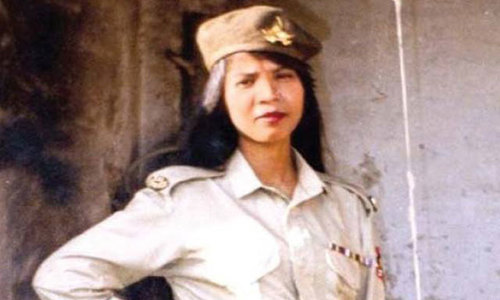LAHORE: The Supreme Court is due to hear the final appeal against the execution of Asia Bibi, accused for blasphemy, on Thursday.
Some insist it is not just a fight for one life, but a battle for the nation's soul as the state walks a razor-sharp line between upholding human rights and appeasing populist hardliners.
This will be the final appeal for Asia Bibi, some six years after she was sentenced to death, accused of insulting the Prophet Mohammed (PBUH) during an argument with a Muslim woman over a bowl of water.
“There is no question that what is at stake is the very soul of the state and Pakistan society: does Pakistan respect the rights of the most vulnerable? Does it defend those rights against spurious allegations even where those allegations involved matters that are sacred to most Pakistanis?” Mustafa Qadri, an expert on human rights in South Asia, told AFP recently.
Bibi was convicted and sentenced to death in 2010, despite her advocates maintaining her innocence and insisting the accusers held grudges against her.
The allegations against Bibi date back to June 2009, when she was labouring in a field and a row broke out with some Muslim women she was working with.
She was asked to fetch water, but the Muslim women objected, saying that as a non-Muslim she was unfit to touch the water bowl.
The women went to a local cleric and accused Bibi of blasphemy against the Prophet Mohammed (PBUH), a charge punishable by death under legislation that rights groups say is routinely abused to settle personal vendettas.
Successive appeals have been rejected, and if on Thursday the three-judge Supreme Court bench upholds Bibi's conviction, her only recourse will be a direct appeal to the president for clemency.
She would become the first person in Pakistan to be executed for blasphemy.
The repercussions for minorities, human rights and the blasphemy laws will be “tremendous” if that happens, says Shahzad Akbar, a human rights lawyer.
“In Pakistan blasphemy cases are mostly misused... it would be a huge blow for minorities in Pakistan who already live in fear,” Akbar explained.
A decision in Bibi's favour, Qadri says, “would send a powerful message to the world that Pakistan respects the rule of law and not the mob.” But he also warned that hardliners “would without question react angrily and likely violently” if Bibi is acquitted.
In 2011, former Punjab governor Salmaan Taseer, who spoke out in support of Bibi, was gunned down in broad daylight in Islamabad.
His assassin Mumtaz Qadri was executed earlier in 2016 in a Supreme Court decision that was hailed by progressives, but brought hardliners into the streets supporting Qadri and demanding Bibi be killed.
Her husband has already written to President Mamnoon Hussain to seek permission to move her to France, where the Council of Paris unanimously adopted a proposal to award honourary citizenship to Asia Bibi in March.
Family in hiding
Bibi's family have lived largely in seclusion since 2010, fearing they will be mistreated if they venture out into the brimming streets of Lahore.
“Papa used to tell me not to go out, the situation out there is very bad,” her daughter Esham, 18, says of the days after Qadri's hanging. “We used to stay inside all the time.”
She is afraid, she says, adding: “Someday someone will come and ask me, are you the daughter of Asia Bibi?” Esham and her sister Esha go twice a month to the south Punjab city of Multan, where their mother is held.
“We talk to our mama about the things at home,” Esham says. “I share my thoughts with her, like mother-daughter stuff.”
The visits begin joyfully, she says, but end in grief. “She becomes sad... her daughters come to meet her from such a long distance and she cannot even hug them.”
According to a tally by Human Rights Watch, 17 people including Bibi remain on death row for blasphemy.
Her case has reached all the way to the Vatican - Esham had a face to face meeting with Pope Francis in April last year as the head of Catholic church offered prayers for her mother.
“He gave me blessings and I can't remember more,” she told AFP.
“I feel the Pope is praying for my mother and he will keep praying, and with his prayers my mother will be freed.” In 2010, Pope Francis's predecessor Benedict XVI also called for Bibi's release.
Her family continue to hope. Esham clears her throat and speaks quietly: “My mom will be released. I ask you to pray for her. “












































